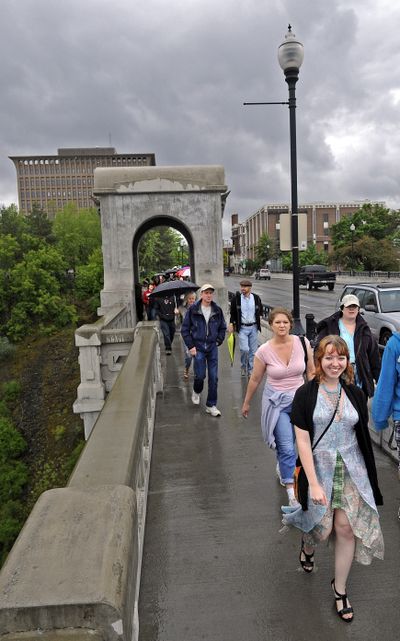SlutWalk marchers fight ‘blame-the-victim’ mindset

Little did a Toronto police officer know when he told some college women to stop dressing provocatively if they don’t want to be sexual assault victims that his comment would ignite a worldwide movement.
About 200 marchers rallied downtown Saturday in Spokane’s first SlutWalk. Their message: No matter what a person is wearing, no one deserves to be raped, assaulted or harassed.
SlutWalk began in Toronto after a police officer there, speaking at a college campus in January, said women wanting to avoid victimization should not dress like “sluts.” He later apologized for the remark, but the quote quickly sparked a movement around the globe.
Organizers of Spokane’s SlutWalk and other SlutWalks around the world say shifting the blame to the victim rather than the perpetrator is a common mentality.
“We won’t stand for that,” said organizer Kelli Crawford. “Blaming the victim is not what we, as a society, should be doing. We need to focus more on the actual perpetrator.”
Those marching Saturday were encouraged to wear whatever was comfortable, whether skirts, fishnet pantyhose and corsets, or sweatpants, sneakers and T-shirts.
Along the way, the marchers chanted “The way I dress does not mean yes,” and “I won’t be blamed, I’m not ashamed.” Information about self-defense classes and other resources was passed out.
While the officer’s remark was aimed at women, men also were invited to the rally; rape and victim-blaming affect both genders, said organizer Taylor Malone.
“Everyone can be a victim of rape,” she said. “Rape doesn’t happen to any particular gender, race, age or any other demographic. It happens to men, it happens to women, it happens to gays, straights, old and young.”
Mark Kloehn, education specialist for the Sexual Assault and Family Trauma Response Center, said blaming a victim has many consequences. The victims may feel ashamed, internalize their trauma, and be less likely to report sexual assault to authorities, keeping perpetrators from being caught and prosecuted.
“When we go to the hospital, the first, second, third, fourth thing we tell victims is it’s not their fault,” he said. “It’s a constant message we have to repeat to them: It’s not your fault.
“It’s our mantra.”
Kloehn also emphasized that people should always seek help when they are assaulted.
“There are services out there in Spokane for victims of sexual assault,” he said.
Crawford agreed that the consequences of victim blaming are profound.
“I think there is definitely shame,” she said. “I know several people … who have been raped on college campuses and don’t want to report it. You just feel powerless. Even your allies turn against you, so a lot of people keep it to themselves.
“It turns something beautiful – sex – into something horrific.”